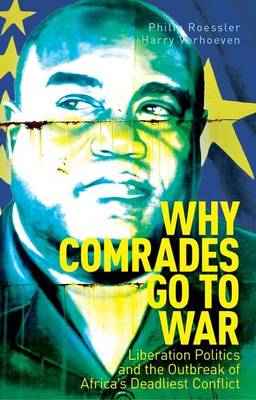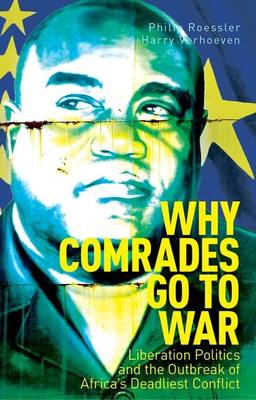
Bedankt voor het vertrouwen het afgelopen jaar! Om jou te bedanken bieden we GRATIS verzending (in België) aan op alles gedurende de hele maand januari.
- Afhalen na 1 uur in een winkel met voorraad
- In januari gratis thuislevering in België
- Ruim aanbod met 7 miljoen producten
Bedankt voor het vertrouwen het afgelopen jaar! Om jou te bedanken bieden we GRATIS verzending (in België) aan op alles gedurende de hele maand januari.
- Afhalen na 1 uur in een winkel met voorraad
- In januari gratis thuislevering in België
- Ruim aanbod met 7 miljoen producten
Zoeken
Why Comrades Go to War
Liberation Politics and the Outbreak of Africa's Deadliest Conflict
Philip Roessler, Harry Verhoeven
Hardcover | Engels
€ 60,45
+ 120 punten
Uitvoering
Omschrijving
In October 1996, a motley crew of ageing Marxists and unemployed youth coalesced to revolt against Mobutu Seso Seko, president of Zaire/Congo since 1965. Backed by a Rwanda-led regional coalition that drew support from Asmara to Luanda, the rebels of the AFDL marched over 1500 kilometers in seven months to crush the dictatorship. To the Congolese rebels and their Pan-Africanist allies, the vanquishing of the Mobutu regime represented nothing short of a 'second independence' for Congo and Central Africa as a whole and the dawning of a new regional order of peace and security. Within fifteen months, however, Central Africa's 'liberation peace' would collapse, triggering a cataclysmic fratricide between the heroes of the war against Mobutu and igniting the deadliest conflict since World War II. Uniquely drawing on hundreds of interviews with protagonists from Congo, Rwanda, Angola, Uganda, Tanzania, Ethiopia, Eritrea, South Africa, Belgium, France, the UK and the US, Why Comrades Go To War offers a novel theoretical and empirical account of Africa's Great War. It argues that the seeds of Africa's Great War were sown in the revolutionary struggle against Mobutu-the way the revolution came together, the way it was organized, and, paradoxically, the very way it succeeded. In particular, the book argues that the overthrow of Mobutu proved a Pyrrhic victory because the protagonists ignored the philosophy of Julius Nyerere, the father of Africa's liberation movements: they put the gun before the unglamorous but essential task of building the domestic and regional political institutions and organizational structures necessary to consolidate peace after revolution.
Specificaties
Betrokkenen
- Auteur(s):
- Uitgeverij:
Inhoud
- Aantal bladzijden:
- 512
- Taal:
- Engels
Eigenschappen
- Productcode (EAN):
- 9780190611354
- Verschijningsdatum:
- 28/02/2017
- Uitvoering:
- Hardcover
- Formaat:
- Genaaid
- Afmetingen:
- 150 mm x 218 mm
- Gewicht:
- 725 g

Alleen bij Standaard Boekhandel
+ 120 punten op je klantenkaart van Standaard Boekhandel
Beoordelingen
We publiceren alleen reviews die voldoen aan de voorwaarden voor reviews. Bekijk onze voorwaarden voor reviews.









